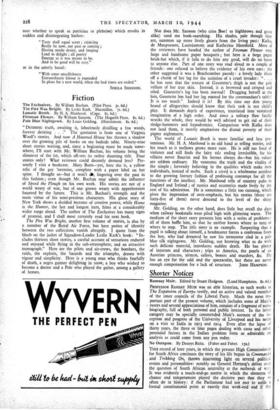Fiction
The Exclusives. By William Buchan. (Pilot Press. 35. 6d.) The Fire Was Bright. By Leslie Kark. Macmillan. 7s. 6d.) Lunatic Broth. By H. A. Manhood. (Cape. 8s. 6d.) Fireman Flow,er. By William Sansom. (The Hogarth Press. 8s. 6d.) Pale Blue Nightgown. By Louis Golding. (Hutchinson. 8s. 6d.)
"DESIRING truth, awaiting it, laboriously distilling a few words, forever desiring . . ." The quotation is from one of Virginia Woolf's stories. And now A Haunted House has thrown a shadow over the growing pile of books on my bedside table. Ninety-nine short stories waiting, and, since a beginning must be made some- where, I'll start with Mr. William Buchan, his volume being the slimmest of the lot, which off-sets its rather daunting title. Four stories only! What reviewer could decently demand less? Pre- sently I visit a bookcase. Mary Butts—yes, here she is, a yellow relic of the gay 'twenties, complete with a paper label on her spine. I thought so—but it won't 0, lingering over the past in this fashion ; even though Mr. Buchan may admit the influence of Speed the Plough on his own work. His stories are not of a world weary of war, but of one grown weary with apprehension haunted by the future. This is Mr. Buchan's strength and the main virtue of his semi-precious characters. His ghost story of New York shows a decided increase of creative power, while Home is the Hunter, the last and longest item, hints at a considerably wider range ahead. The author of The Exclusives has many signs of promise, and I shall most certainly read his next book.
The Fire Was Bright, another first volume of stories, is also by a member of the Royal Air Force, but here points of identity between the two collections vanish abruptly. I quote from the blurb on the jacket of Squadron-Leader .Leslie Kark's book : "In- cludes thirteen short stories, a careful account of sensations endured and enjoyed while flying in the sub-stratosphere, and an attractive monograph." Here are the pilots and air-crews, the bombers, the raids, the exploits, the hazards and the triumphs, drawn with vigour and simplicity. Here is a young man who thinks fearfully of death, a negro gunner delighting in snow, a boy who wished to become a doctor and a Pole who played the guitar, among a gallery of heroes. Nor does Mr. Sansom (who cries Boo! to highbrows and geese alike) send me book-searching. His shades, pale though they are, summon up more lively ghosts from the living pass : Kafka, de Maupassant, Lautreamont and Katherine Mansfield. Most of the reviewers have handed the author of Fireman Flower very large and handsome paper bouquets ; but here is a large paper brick-bat which, if it fails to do him any good, will do no harm to anyone else. Part of one story was read aloud to a couple of friends: one refused to believe the evidence of his own ears : the other suggested it was a Beachcomber parody : a lovely lady slices off a chunk of her leg for the satiation of a cruel invader : " . . he has seen that the texture of Gaustette's thigh is not the pale vellum of her true skin. Instead, it is browned and crisped and oiled. Gaustette's leg has been roasted! Drugging herself at the loin, Gaustette has had her leg roasted for the commandant's table! It is too much." Indeed it is! By this time our dim young brand of allegoryites should know that their task is not child's play. It demands depth of experience, translated into sustained imagination of a high order. And since a solitary flaw fatally wrecks the whole, they would be well advised to get rid of their sledge-hammers and hypodermics. Comparison with Kafka does not laud them, it merely emphasises the dismal poverty of their pigmy nightmares.
The world of Lunatic Broth is more familiar and less pre- tentious. Mr. H. A. Manhood is an old hand at telling stories, and his touch as it mellows grows more sure. He is still too fond of violence and still finds the fairy tale ending irresistible, for his villains never flourish and his heroes always do—but his values are seldom ordinary. He venerates the truth and the vitality of the simple ; fervently believing in the qualities which make men individuals, instead of mobs. Such a creed is a wholesome antidote to the growing literary fashion of professing contempt for all the functions of the intellect. Mr. Manhood tells of country pubs in England and Ireland ; of rustics and eccentrics made lively by the zest of his admiration. He is sometimes a little too cunning, which gives the impression of over-emphasis, but his stories (there are forty-five of them) never descend to the level of the shiny magazine.
Mr. Golding, on the other hand, does little but recall the days when railway bookstalls were piled high with glittering wares. The medium of the short story presents him with a series of problems: all of them baffle him, so that he neither knows where to turn or where to stop. The title story is an example. Suspecting that a pupil is talking about himself, a headmaster forces a confession from the boy, who had dreamed he saw his tormentor clad in a pale blue silk nightgown. Mr. Golding, not knowing what to do with such delicate material, introduces sudden death. He has plenty of interests and characters ; trips to America, the pearls of an Austrian princess, airmen, sailors, boxers and murders, &c. He has an eye for the odd and the spectacular, but these are never
enough compensation for a lack of structure. JOHN HAMPSON.


























 Previous page
Previous page